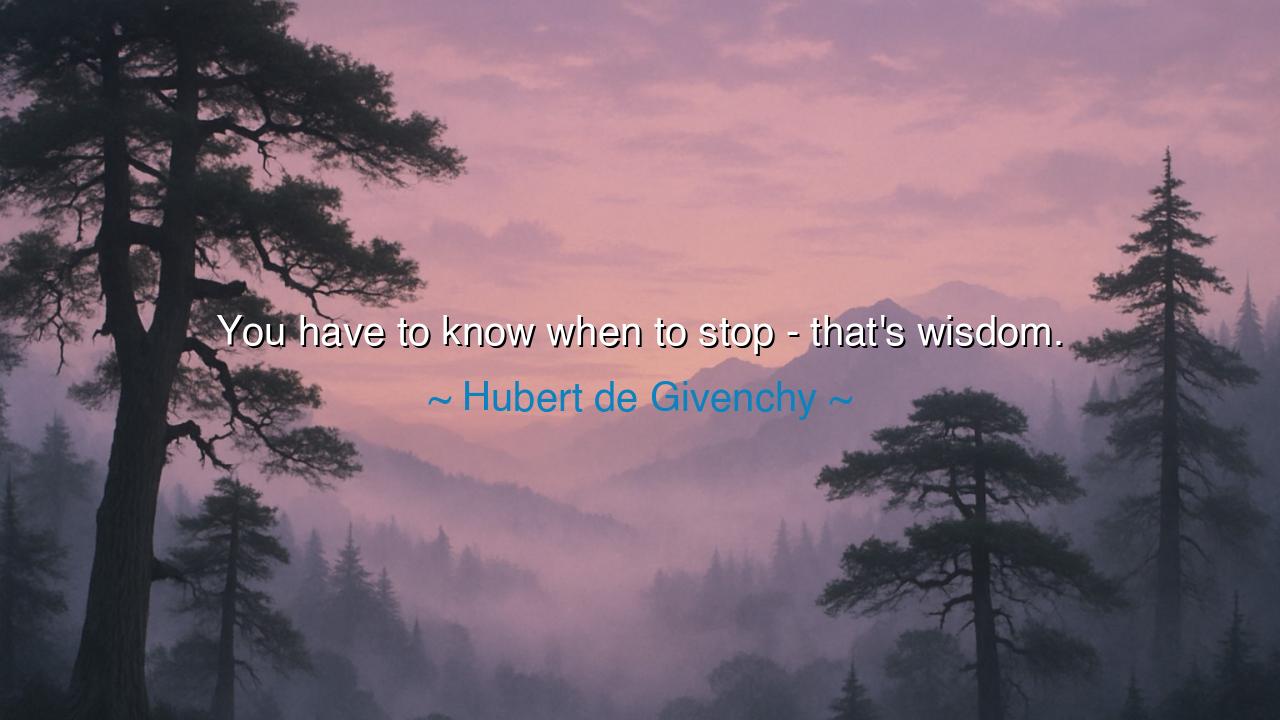
You have to know when to stop - that's wisdom.






Hearken, O children of the ages, to the austere and luminous words of Hubert de Givenchy, who speaks of the subtle mastery of restraint. He teaches that to know when to stop is the essence of wisdom, for excess, though often seductive, clouds judgment, distorts purpose, and diminishes the beauty of the whole. The wise discern the measure in all things, understanding that greatness lies not merely in doing, but in knowing the bounds of action.
Givenchy reminds us that life itself, like art or craft, is governed by proportion and moderation. To pursue endlessly without pause is to invite disorder; to cease at the appointed moment is to preserve clarity, elegance, and integrity. Wisdom manifests in the recognition that restraint is not weakness, but the deliberate shaping of one’s deeds to their highest effect. In stopping, the virtuous honor both the moment and the meaning.
Consider the life of Michelangelo, whose sculptures of marble and frescoes of Sistine Chapel stand as testaments to mastery. Though capable of laboring ceaselessly, he understood that the perfection of form often requires cessation, that the work attains its splendor when tempered by discretion. In the pause, the art breathes; in the end, the vision is preserved. Here is the embodiment of Givenchy’s teaching: knowing when to stop is the measure of genius and the mark of true wisdom.
Even in humbler spheres, this principle endures. The artisan who knows when to lay down the brush, the speaker who pauses before words become redundant, the leader who refrains from overreach—each exercises the wisdom of restraint. To stop at the appointed time is to honor purpose over impulse, and to safeguard the integrity of effort against the perils of excess.
O children of the future, carry this teaching in your hearts: cultivate the discernment to act fully, yet recognize the sacred boundary where action must yield to completion. Wisdom lies not in endless striving, but in the judgment to cease, to preserve what is achieved, and to honor the balance of life, art, and spirit. In this mastery of pause, the soul attains clarity, power, and enduring beauty.
If you desire, I can also craft a visual, ancient scroll-style presentation of this passage to capture the heroic, timeless, and deeply evocative essence of Givenchy’s teaching on restraint, judgment, and the wisdom of knowing when to stop.






TDThao Do
Reading this, I consider the role of emotional intelligence in knowing when to stop. How much does self-control, patience, and understanding of consequences factor into this wisdom? Are there moments when stopping is an act of courage rather than weakness? I’m curious about examples in history, business, or art where restraint led to success, and whether failing to stop at the right moment often results in regret or missed opportunity.
TTTam Tran
This perspective raises questions about balance and moderation. Is knowing when to stop primarily a practical skill or a philosophical one? How do we differentiate between stopping out of fear and stopping out of insight? I also wonder whether society undervalues the ability to stop at the right time, favoring boldness and risk-taking, and whether cultivating this restraint could lead to more thoughtful, sustainable choices in personal and professional life.
TTruong
I feel intrigued by the subtlety of this idea, as it suggests that wisdom is as much about restraint as it is about action. Could this principle be applied to financial decisions, creative endeavors, or even interpersonal conflicts? How does one develop the sensitivity to recognize when continuation may harm rather than help? I’m curious whether this is more about self-awareness, discipline, or experience accumulated over time.
GDGold D.dragon
This statement prompts reflection on decision-making and timing. Is the ability to stop a skill that can be learned, or is it mostly innate? How do mentors, experience, or reflection help cultivate this type of judgment? I also wonder how fear of stopping too soon versus fear of going too far influences our choices, and whether modern life—with its constant stimuli and pressures—makes it harder to practice this form of wisdom.
YACai nay He Thong that hieu y a
Reading this, I’m struck by the idea that stopping can be more difficult than starting. How do people distinguish between persistence and stubbornness? Could knowing when to stop be a key factor separating success from failure in careers or art? I’m curious about how cultural and personal differences shape this perception of restraint, and whether some societies encourage risk-taking at the expense of this form of wisdom.